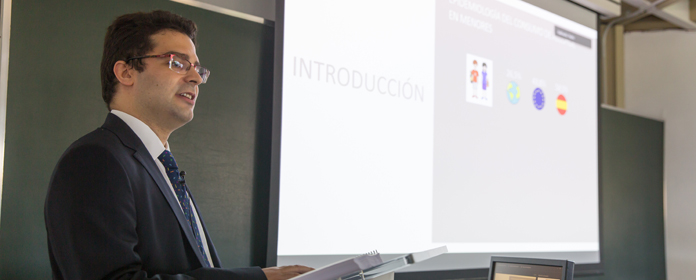A thesis of the University of Navarra analyses the use of educational video games to prevent alcohol consumption among minors.
Pedro de la Rosa, from the ICS, recalls that in the last decade the percentage of adolescents who consume alcohol "on a binge" has increased, which includes up to half of those who drink.

PHOTO: Manuel Castells
"Educational video games can emulate the effects of traditional underage drinking prevention programs if they are designed with the experience of Usernamein mind". This is the conclusion of Pedro de la Rosa in his thesis doctoral dissertation, which he has carried out at the Institute for Culture and Society (ICS) under the direction of Full Professor Jokin de Irala and defended at the School of Medicine of the University of Navarra.
As he explains, the usual prevention techniques, "when well implemented, help to reduce health risk habits in adolescents". The problem, he points out, is that "not infrequently schools cannot afford the cost in time and money to train teachers in the techniques necessary for their implementation".
Under these circumstances, he proposes as an alternative in the centers of training "the use of preventive programs based on information technologies, whether gamified or not", although he warns that ideally these initiatives should be guided by "the work of a trained professional who knows his students".
He states that the pandemic has forced institutions to adopt the technique as part of the teaching. He believes that, "fortunately, this has increased the perception that it is necessary to invest in its research and development, so it is possible that in the future teachers will be able to choose from a wide range of digital educational programs to prevent the emergence of risky behaviors among their student body".
To develop his thesis , Pedro de la Rosa has counted on the participation of a varied sample of public and subsidized urban and rural schools, which played Aislados, a project promoted by the Ministry of Health and the Interdisciplinary Service for Drug Addiction Care (SIAD).
Customization according to the circumstances of the UsernameAccording to his analysis, agreement , gamification "must be adapted to the needs of both the teacher and the students". And he assures that the most effective strategy is "targeted feedback", that the program personalizes the information for each young person, according to his or her circumstances.
"Users appreciated that the program offered them the opportunity to make weighty decisions and be able to interact with others," he says. "For example, many narrative video games have different endings, which are triggered by the player's decisions. It has been shown that those who make poor decisions in this subject of games are more receptive to changing the beliefs that motivated them to make those decisions."
The new doctor recalls that, from agreement with the data of the survey on Drug Use in Secondary Education in Spain, three out of four students between 14 and 18 years of age have drunk alcohol in the last year. This prevalence is double that of the second most consumed substance, tobacco.
"Although the percentage of adolescents drinking alcohol has declined over the past decade, the same has not been true for the percentage of those who binge drink (several drinks on one occasion), which comprises up to half of young people who drink," he laments.
"Adolescents," he adds, "tend to overestimate the percentage of people their age who drink and do not tend to contrast their beliefs with reality. In the most effective traditional programs, group discussion techniques are used to break down the false beliefs that normalize drinking."
In his thesis , developed in the project 'Education of affectivity and human sexuality', he has reviewed the scientific literature in search of preventive programs through the Internet that attempt to encourage interaction among their users in a similar way to traditional programs. Although he concludes that, to date, this technique has rarely been used, the data of his study suggests that it enhances their effectiveness.
"In addition, teenagers often apply for that the educational programs they use have social features that allow them to cooperate with their peers in a similar way to the video games they use," he concludes.
